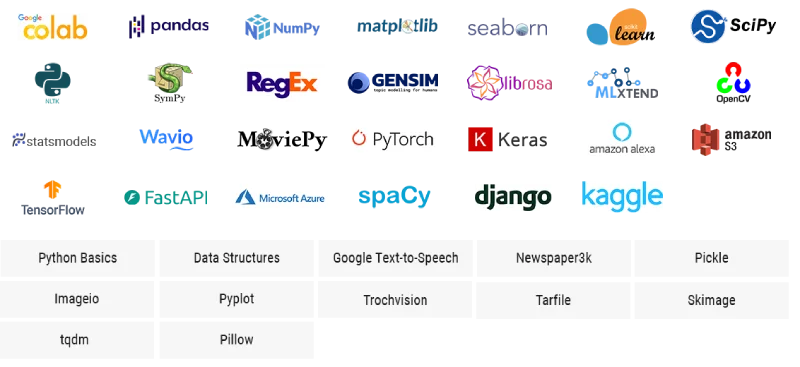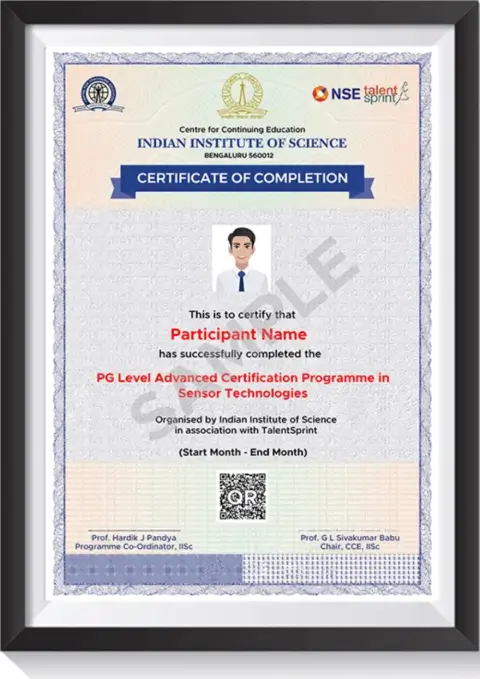 Designed by WSAI at IIT Madras, India’s #1 ranked institution by NIRF in Engineering
Designed by WSAI at IIT Madras, India’s #1 ranked institution by NIRF in EngineeringLinear equations and solutions Matrices and their Properties; Eigenvalues and eigenvectors; Matrix Factorizations; Inner products; Distance measures; Projections; Notion of hyperplanes; halfplanes.
Probability theory and axioms; Random variables; Probability distributions and density functions ;Expectations and moments; Covariance and correlation; Statistics and sampling distributions; Hypothesis testing of means, proportions, variances and correlations; Confidence intervals; Correlation functions; Parameter estimation – MLE and Bayesian methods
Unconstrained optimization; Necessary and Sufficiency conditions for optima; Gradient descent methods; constrained optimization, KKTConditions; Introduction to least squares optimization;
Learning Outcomes: By completing this module, you will gain a solid foundation in Python programming and key concepts in probability and statistics for data-driven decisions. You'll also learn basic calculus to understand change and trends, along with optimization techniques to solve real-world problems and enhance performance.
Learning Outcomes: In this module, you’ll explore core machine learning algorithms like linear regression, decision trees, and k-nearest neighbors. You’ll learn to train, evaluate, and apply these models effectively, and develop the skill to choose the right algorithm based on the problem and data.
1. Use cases from the healthcare domain where NLP is applied
2. Models such as Bi-LSTM-CRF, CAML, HAN, ResNexT.
3. Public domain datasets - MIMIC-III.
Introduction to big data in biology
Levels of omics data, basic information flow in biology
Importance of Networks in Biology: Overview
Introduction to Network Science
Learning from Network structure: Predicting essential genes
Learning on Networks: Community detection to identify disease genes - Learning using Networks: Graph mining for predicting biosynthesis routes - Omic data analysis: Predicting mutations and genes that drive cancer
1. Problem Statement : Four case studies will be demonstrated. CS1: Choice of mode CS2: Travel time estimation CS3: Accident hot spot analysis CS4: Accident severity modelling
2. Model(s) intended to demonstrate : Logistics regression, Support vector regression, k-means clustering and random forest
3. Dataset to be used during the demo
4. Dataset for the mini project
1. Levels of omics data, basic information flow in biology
2. Genomics, Transcriptomics, Epigenomics, Proteomics and Multi omics - Identification human disease genes using genomics
3. Application of transcriptomics for identifying disease mechanisms
4. Clinical data - kinds of clinical data Garbhini dataset - a clinical data case study
Learning Outcomes: In this module, you'll explore how machine learning drives innovation in industries like healthcare, finance, and marketing. You'll learn to analyze real-world use cases, understand the ML workflow, and identify problems where ML can create practical impact.
a. Artificial Neuron
b. Multilayer Perceptron
c. Universal Approximation Theorem
d. Backpropagation in MLPs
e. Backprop on general graphs
a. Gradient Descent and its variants
b. Momentum, Adam, etc.
c. Batch Normalization
a. Introduction
b. CNN Operations
c. CNN Training
d. Illustrative Example (“Hello World”) - MNIST digit classification e. Image Recognition-SoTA model(s)
f. Object detection/localization - SoTA model(s)
g. Semantic segmentation -SoTA model(s)
Learning Outcomes: At the end of this module you will gain knowledge about foundation in deep learning, from understanding neural networks to building and training models using TensorFlow or PyTorch. Learn to apply these techniques to real-world tasks like image classification, NLP, and explore their role in powering Generative AI.
a. Smart Cities
b. Industry Use case 1
c. Climate Science
d. Manufacturing
e. Bio-informatics
Industry Use case 2
Learning Outcomes: At the end of this module, you'll understand how deep learning powers real-world applications like image recognition, speech processing, and recommendation systems. You'll also learn to select the right architectures for different problems and tackle key deployment challenges.


**Dates will be decided keeping the safety of participants in mind. Fees will be based on actuals.